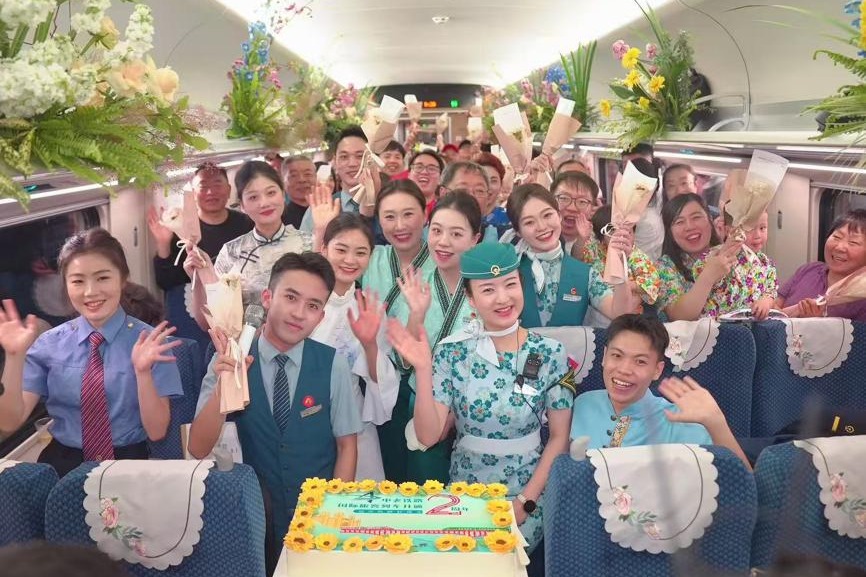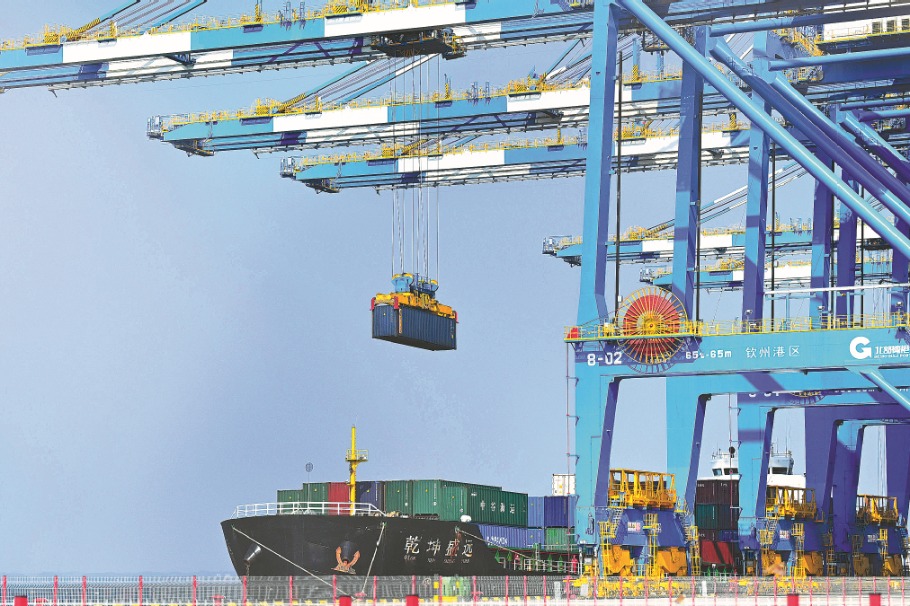Walking the talk
By ALEXANDRA WONG | China Daily | Updated: 2018-04-27 22:41

The "she economy" may be on the rise but, according to Genecia Alluora Luo, we are barely scratching the surface of its potential.
"In Southeast Asia, women only represent 11 percent of all entrepreneurs. In China, this figure drops to 6.4 percent," she said.
She added: "What's striking, (and) contrary to popular belief, the biggest barrier to entry is not technical expertise, but limiting self-belief. Forty-eight percent of women in Asia cite fear of failure as the No 1 reason holding them back, while lack of confidence (39 percent) ranks a close second."
"There is a saying that women hold up half the sky. Imagine if we can transform their mind-sets, how far we can move the needle."
Luo is the founder of Soul Rich Woman, a regional platform that empowers women entrepreneurs by providing practical educational resources and a support network of female mentors. SRW's mission statement — "Alone we are strong, together we are unstoppable" — says it all.
In a crowded marketplace where business gurus and life coaches are often viewed as snake oil salesmen, SRW has created a position of authority, with more than 10,000 active members in 15 countries.
This feat is widely credited to its founder's "walk the talk" approach. SRW arose from Luo's own experiences, navigating the pitfalls of being an entrepreneur — from being swindled by a partner to tackling massive debt.
Born in Singapore, Luo had an early initiation into business. At 14, she taught aerobics, yoga and line dancing at a community center to help support her family financially.
"To make it worse, my students were skeptical adults who constantly questioned my qualifications.
"One day, I came home crying that I wanted to quit," she recalled. "My mother would have none of it. She told me I was going to face tougher challenges in this world; it's part of my journey."
Looking back, Luo is grateful for the experience as it taught her the first lesson of entrepreneurship: A resilient mind-set.
"You are not what you have done, you are what you have overcome. You can choose to be a victim of your circumstances and not to learn anything, or you can view every experience as a stepping stone to do something out of your comfort zone."
And that is precisely what Luo did. The reluctant yoga teacher went on to train and supply yoga trainers to other community centers, marking her maiden foray into the business world.
Luo's newfound confidence motivated her to venture into uncharted waters. At the behest of her friends, she enrolled in The New Face Competition 2003, Singapore's then answer to America's Next Top Model.
Her friends coached her on personal branding and public speaking, and to her surprise, she finished in the top 20. Buoyed by this modest success, she tried her luck again. A few pageants later, she bagged the Miss Singapore International 2006 title.
From here, Luo set out to seize personal development opportunities.
"I took certificates in public speaking, NLP (natural language processing), grooming and etiquette, and soaked it up like a sponge," she said.
Luo then set up an image consultancy company that trained and groomed C-level executives, celebrities and pageant hopefuls. InQueenz produced 50 contest winners, cementing Luo's growing reputation as a "charisma coach".
At the same time, Luo partnered with friends to launch e-commerce platforms to sell skin care products and clothes. She also ventured into a coffee retail chain that eventually expanded to seven outlets in three countries.
Though the businesses were ultimately profitable, Luo made some costly rookie mistakes along the way — including incurring a six-figure debt because of a partnership gone awry.
The stress drove her to depression and she contemplated suicide. As a last resort, she sought help from James Wee, a bankrupt-turned-millionaire entrepreneur.
Inspired by their interactions, Luo started to think: What if she shared her experiences with other women in the same boat?
With this in mind, Luo began to share her business experiences online. Her videos on Google Hangouts showcased her straight-talking, energetic style, which quickly attracted a large following of female entrepreneurs.
Every Wednesday she would speak to her fans online. "If you interview my SRW members, many will tell you they joined SRW because they had been quietly following my live shows for years."
As Luo's confidence grew, she began charging for her online services. Within three months, she sold S$100,000 ($76,000) worth of software products, online courses and business coaching content, "without networking and without meeting a single person".
"That was my 'Aha!' moment — when I realized the power of internet marketing."
In 2015, Luo formally launched SRW. It started as a virtual classroom featuring home-produced videos and tutorials, swipe files and business starter templates.
SRW has since diversified into a multinational franchise. In addition to distributing business-related content across websites, video and social media channels, SRW's offerings now include one-on-one mentorship programs, monthly networking events, and #WeEmpower, a yearly women's empowerment conference.
Asia can expect the role of women's networking to assume greater significance as female entrepreneurship continues to rise, said Luo.
SRW works to build its community of female mentors, known as community leaders, in member countries.
"When new members encounter a hiccup, we want them to know that they are not alone, that they can instantly access experts who have been where they are trying to go, and know how to address their challenges."
With more than 250,000 users now engaging with SRW, the platform recently rolled out the next phase of its plan, to translate its content into local languages.
It started with Vietnam, where SRW has a strong community of members who have lived and worked overseas.
Luo hopes to expand SRW to 20 countries by the end of 2018, with China being one of them.
"When I was there, I met so many women who were actively educating themselves about e-commerce. The other thing we noticed is that Chinese women are well-connected; there is a high percentage of women who know other women business owners. This can be a powerful starting point to refer business."
Given SRW's unique business model and rising profile, a number of prominent organizations, including Facebook and Shopify, have approached Luo to help develop support programs for aspiring women entrepreneurs.
Although Luo still produces livestream videos and podcasts, she actively encourages members to take the podium as well.
"The diversity of our members means they can bring different things to the table. We must leverage this social capital if we want to build a critical mass of female entrepreneurs."
To focus on SRW, Luo decided to exit all her other businesses. Explaining the discipline that drives her passion, she said: "I am really excited that in our small way, SRW is contributing to the Asian economy by cultivating more successful entrepreneurs and small businesses.
"With SRW widely regarded as the most powerful women's entrepreneurial network in Asia, we are in a unique position to effect change.
"I was fortunate to learn, early on, that with strong support and a positive mind-set, women can build the life of their dreams. It's my turn now to pay it forward; I want to help lift other women like myself to reach for the skies."
























